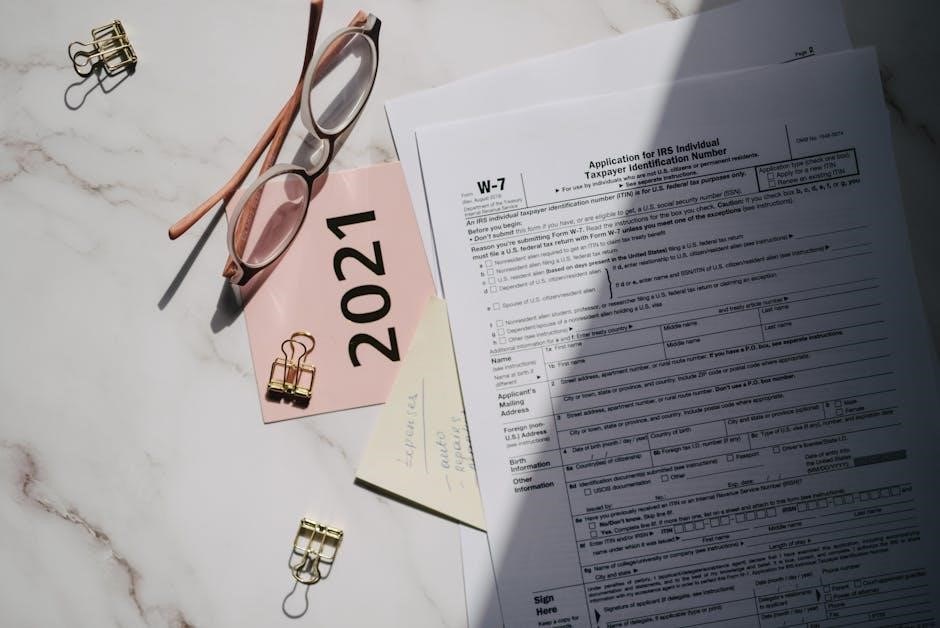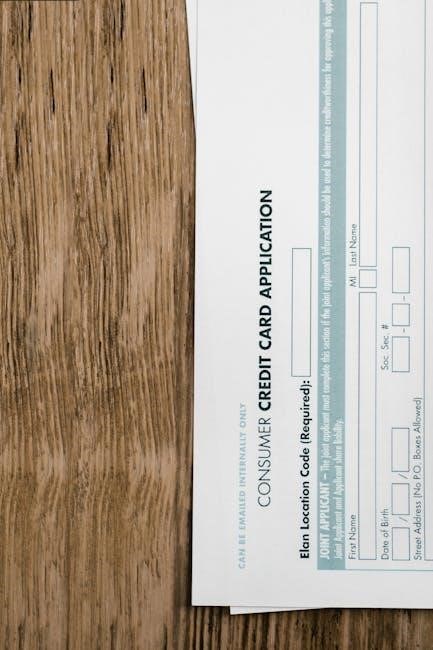Understanding the British Columbia Rental Application Form

The British Columbia Rental Application Form is a standardized document used by landlords to assess potential tenants․ It is designed to gather essential information while ensuring compliance with provincial tenancy laws․ The form typically includes sections for personal‚ rental‚ and employment history‚ helping landlords evaluate suitability․ It is regulated to prevent unfair practices and ensure transparency in the rental process․
1․1 Purpose and Structure of the Rental Application Form

The British Columbia Rental Application Form is designed to help landlords evaluate potential tenants fairly and efficiently․ Its primary purpose is to collect essential information about applicants‚ ensuring compliance with provincial tenancy laws․ The form is structured to include sections for personal details‚ rental history‚ employment information‚ and financial stability․ It may also request consent for credit checks and criminal record searches․ The standardized format ensures transparency and fairness‚ protecting both landlords and tenants․ By organizing information clearly‚ the form streamlines the screening process‚ helping landlords make informed decisions while adhering to legal guidelines․
1․2 Key Components of the Application
The British Columbia Rental Application Form includes several key components essential for landlords to assess potential tenants․ Personal information such as name‚ contact details‚ and identification are typically required․ Applicants must provide rental history‚ including previous landlords and addresses‚ to demonstrate reliability․ Employment details‚ including current position‚ income‚ and employer contact‚ help verify financial stability․ The form may also request consent for credit checks and criminal record searches․ Additionally‚ some applications ask for references or co-signers․ These components ensure landlords can evaluate applicants thoroughly while complying with legal standards‚ fostering a fair and transparent rental process․
Legal Requirements for Rental Applications in British Columbia
The British Columbia rental application process must comply with provincial tenancy laws‚ balancing landlord and tenant rights․ Landlords cannot request prohibited information‚ ensuring fair and non-discriminatory practices․
2․1 Landlord and Tenant Rights and Responsibilities
Landlords in British Columbia must provide a safe and habitable living environment‚ respect tenants’ privacy‚ and follow the Residential Tenancy Act․ Tenants are responsible for paying rent on time‚ maintaining the property‚ and complying with the terms of the tenancy agreement․ Both parties must adhere to their respective obligations to avoid disputes․ The Residential Tenancy Branch oversees these rights and responsibilities‚ ensuring fairness and compliance․ Understanding these legal duties is crucial for maintaining a positive landlord-tenant relationship and resolving conflicts effectively․ Failure to fulfill these responsibilities can lead to legal consequences‚ emphasizing the importance of awareness and adherence to the law․ This balance ensures a fair rental process for all parties involved․
2․2 Prohibited Information on Rental Applications

British Columbia rental applications are subject to strict regulations regarding prohibited information․ Landlords cannot request details about a tenant’s marital status‚ number of children‚ ethnicity‚ religion‚ sexual orientation‚ or age․ Additionally‚ questions about a prospective tenant’s criminal record‚ unless directly relevant to tenancy‚ are generally prohibited; Social insurance numbers and citizenship status are also off-limits․ These restrictions aim to prevent discrimination and ensure fair housing practices․ Violating these rules can lead to legal consequences for landlords․ Tenants have the right to report inappropriate or unlawful inquiries to the Residential Tenancy Branch․ Adhering to these guidelines ensures a fair and lawful rental application process for all parties involved․ This protects both tenants and landlords by maintaining transparency and equity in the screening process․

Completing the Rental Application Form
Completing the form requires accurate personal details‚ employment history‚ and rental references․ Ensure all sections are filled clearly to avoid delays in processing․
3․1 Steps for Tenants to Fill Out the Application
Tenants should start by carefully reviewing the application form to understand all required information․ Gather necessary documents such as identification‚ employment proof‚ and rental history․ Fill in each section accurately‚ ensuring all personal details are up-to-date․ Be honest and transparent‚ as false information can lead to rejection․ Double-check for any errors or omissions before submission․ Including references from previous landlords or employers can strengthen the application․ If unsure about any part‚ tenants may seek clarification from the landlord or property manager․ Timely submission is crucial to secure the rental property․
3․2 Tips for Landlords to Screen Applicants Effectively
Landlords should verify the accuracy of information provided on the rental application․ Contacting references‚ such as previous landlords or employers‚ can provide valuable insights․ Reviewing credit reports and rental history helps assess financial reliability․ Avoid asking prohibited questions to ensure compliance with tenancy laws․ Use a consistent evaluation process for all applicants to maintain fairness․ Consider implementing a scoring system to objectively compare candidates․ Document all steps taken during the screening process to avoid disputes․ Ensure clear communication with tenants regarding the application status․ By following these steps‚ landlords can make informed decisions while respecting legal and ethical standards․ This approach fosters trust and ensures a smooth tenancy process․
Processing and Evaluating Rental Applications
Landlords must verify applicant information‚ review credit reports‚ and assess rental history to ensure suitability․ This process helps make fair and informed tenancy decisions efficiently․
4․1 What Landlords Should Look for in an Application
Landlords should focus on verifying rental history‚ employment stability‚ and creditworthiness․ They must ensure the application is complete and free from inaccuracies․
Checking references and previous landlord contacts is crucial to assess reliability․
Landlords should also review credit reports for financial stability and ensure compliance with tenancy laws to avoid discrimination or unfair practices․
4․2 Approving or Rejecting Applications
Landlords in British Columbia must make decisions based on lawful criteria‚ avoiding discrimination․ Approval is granted if the applicant meets rental criteria‚ while rejection requires valid reasons․
Landlords should notify applicants promptly‚ ensuring transparency and fairness․ If rejected‚ applicants may dispute the decision through the Residential Tenancy Branch․
Clear communication and adherence to tenancy laws are essential to maintain a fair and legal process․

Common Issues and Disputes
Disputes often arise over application fees‚ excessive information requests‚ or discrimination concerns․ Tenants may challenge unfair practices‚ while landlords face issues with incomplete or misleading applications․

5․1 Disputes Over Application Fees or Requirements
Disputes often arise from excessive application fees or unreasonable requirements․ In British Columbia‚ landlords can charge a limited fee for processing applications‚ typically capped at $100 including tax․ Tenants may object to paying such fees‚ especially if they believe the charges are unfair or unnecessary․ Additionally‚ disputes can occur if landlords request information beyond what is legally permissible‚ such as invasive personal details․ Tenants have the right to challenge such practices through the Residential Tenancy Branch‚ ensuring compliance with the Residential Tenancy Act․ These issues highlight the need for clear guidelines to balance landlord needs with tenant rights‚ promoting a fair rental application process․
5․2 Discrimination Concerns in Rental Applications
Discrimination is a significant issue in rental applications‚ as landlords must avoid unfair practices․ British Columbia’s Residential Tenancy Act prohibits discrimination based on race‚ gender‚ age‚ religion‚ disability‚ or family status․ Tenants may face issues if landlords request prohibited information‚ such as marital status or number of children․ Such practices can lead to legal consequences‚ including fines․ Tenants who believe they have been discriminated against can file complaints with the Residential Tenancy Branch or the Human Rights Tribunal․ Ensuring fairness and compliance with anti-discrimination laws is crucial for landlords to avoid disputes and legal action‚ promoting an equitable rental process for all applicants․

Resources and Support
Tenants and landlords in British Columbia can access resources like the Residential Tenancy Branch for guidance on rental applications and disputes․ Official forms and additional support materials are also available online to ensure compliance with provincial tenancy laws and regulations․
6․1 Where to Find the Official BC Rental Application Form
The official British Columbia Rental Application Form can be obtained from the Residential Tenancy Branch (RTB) website․ It is also available through legal aid offices and tenant advocacy groups․ Additionally‚ many online platforms offer editable templates that comply with BC tenancy laws․ Landlords and tenants are encouraged to use these official sources to ensure the form meets legal requirements and protects both parties․ Accessing the form from reputable sources helps prevent errors and ensures compliance with provincial regulations․

6․2 Additional Resources for Tenants and Landlords
Beyond the official form‚ tenants and landlords in British Columbia can access various resources to navigate the rental process․ The Residential Tenancy Branch (RTB) provides comprehensive guides and dispute resolution services․ Legal aid offices and tenant advocacy groups offer free or low-cost assistance․ Online platforms like Lumin provide editable templates and guides for tenant screening․ Additionally‚ educational resources such as courses on housing rights and tenancy agreements are available․ These tools help ensure both parties understand their rights and responsibilities‚ fostering a fair and informed rental relationship․ Utilizing these resources can prevent disputes and promote a smooth tenancy experience․